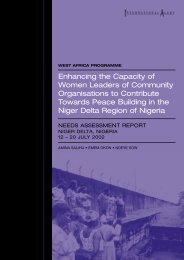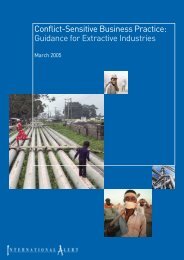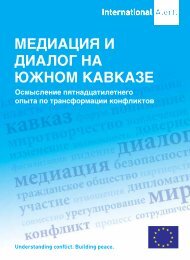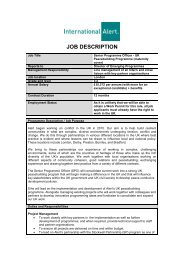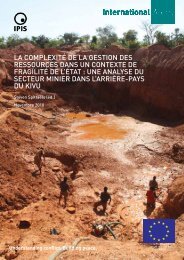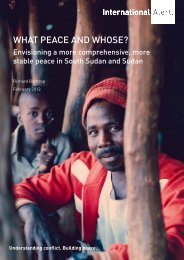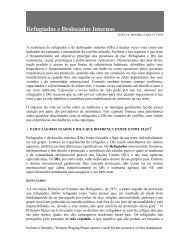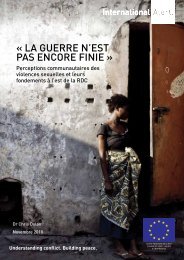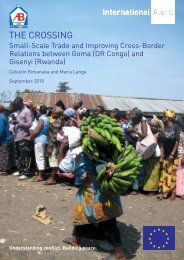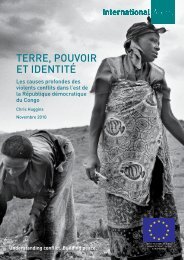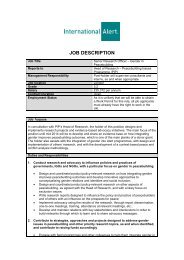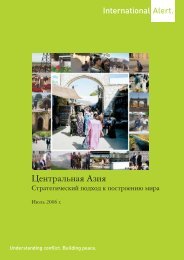Walking in the Dark: informal Cross-border trade ... - International Alert
Walking in the Dark: informal Cross-border trade ... - International Alert
Walking in the Dark: informal Cross-border trade ... - International Alert
You also want an ePaper? Increase the reach of your titles
YUMPU automatically turns print PDFs into web optimized ePapers that Google loves.
<strong>Walk<strong>in</strong>g</strong> <strong>in</strong> <strong>the</strong> <strong>Dark</strong>: Informal <strong>Cross</strong>-<strong>border</strong> Trade <strong>in</strong> <strong>the</strong> Great Lakes Region<br />
5<br />
The ma<strong>in</strong> f<strong>in</strong>d<strong>in</strong>gs of this research are:<br />
1. The revenue generated by <strong>trade</strong> is mostly spent on households to cover basic needs such as<br />
food and school<strong>in</strong>g. Women <strong>in</strong> particular play an important role <strong>in</strong> this <strong>trade</strong>, as <strong>the</strong>y make<br />
up <strong>the</strong> majority of <strong>the</strong> <strong>trade</strong>rs and rely on it as <strong>the</strong>ir primary means of subsistence. Women<br />
<strong>trade</strong>rs above all sell food produce with a low market value, whereas <strong>the</strong>ir male counterparts<br />
sell a wider variety of products with a higher value.<br />
2. Women <strong>trade</strong>rs face specific difficulties: <strong>the</strong>y have <strong>the</strong> lowest levels of start-up capital, <strong>the</strong>y<br />
generally <strong>trade</strong> goods which generate <strong>the</strong> lowest levels of profit, and <strong>the</strong>y face harassment at<br />
<strong>the</strong> <strong>border</strong>, as well as a negative perception of <strong>the</strong>ir activities (except with<strong>in</strong> <strong>the</strong>ir own family).<br />
Fur<strong>the</strong>rmore, <strong>the</strong>ir commercial activities do not free <strong>the</strong>m from <strong>the</strong>ir family responsibilities:<br />
<strong>the</strong>ir work means <strong>the</strong>y return home late <strong>in</strong> <strong>the</strong> even<strong>in</strong>g and must <strong>the</strong>n complete <strong>the</strong>ir household<br />
chores.<br />
3. For both male and female <strong>trade</strong>rs, access to capital is limited and ma<strong>in</strong>ly depends on<br />
household resources. DRC specifically faces a fur<strong>the</strong>r problem, that of <strong>in</strong>formal taxes and<br />
<strong>the</strong> many agencies with a presence on <strong>the</strong> <strong>border</strong>. In some cases this results <strong>in</strong> <strong>trade</strong>rs be<strong>in</strong>g<br />
mistreated by public officials. The <strong>in</strong>terviews carried out with <strong>trade</strong>rs revealed that <strong>the</strong>y<br />
had a preference for <strong>in</strong>formal taxes as <strong>the</strong>y were “negotiable”; however, (i) certa<strong>in</strong> taxes are<br />
not supposed to be paid and <strong>the</strong>refore constitute a violation of national laws, and (ii) <strong>the</strong>se<br />
taxes are based on <strong>in</strong>formal agreements that are unpredictable, not susta<strong>in</strong>able and must<br />
constantly be renegotiated.<br />
4. The <strong>trade</strong>rs’ lack of awareness of <strong>the</strong>ir rights and responsibilities is a major problem. They are<br />
generally unaware of tax rates, <strong>the</strong> different (national and regional) treaties and regulations<br />
<strong>in</strong> force, and <strong>the</strong> specific roles and responsibilities of <strong>the</strong> various <strong>border</strong> agencies.<br />
5. Relations between <strong>trade</strong>rs are sometimes fraught and <strong>the</strong>y compla<strong>in</strong> of discrim<strong>in</strong>ation,<br />
harassment, among o<strong>the</strong>rs, from <strong>the</strong>ir counterparts <strong>in</strong> o<strong>the</strong>r countries. These difficulties reflect<br />
a climate of commercial competition, but <strong>the</strong>y are also <strong>the</strong> result of a history of regional<br />
violence now rooted <strong>in</strong> <strong>the</strong> population’s memory and which is reflected <strong>in</strong> <strong>the</strong> prejudices,<br />
stereotypes and rumours used by one group aga<strong>in</strong>st ano<strong>the</strong>r. 5<br />
6. The <strong>trade</strong>rs are often badly organised. A m<strong>in</strong>ority of <strong>the</strong>m are members of associations or<br />
cooperatives, and <strong>the</strong>se are generally weak and tend to have compet<strong>in</strong>g relationships with<br />
one ano<strong>the</strong>r. The vast majority of <strong>trade</strong>rs who do not belong to an association or cooperatives<br />
strongly desire to do so, but feel that this is beyond <strong>the</strong>ir capabilities.<br />
The ma<strong>in</strong> recommendations based on this research, addressed respectively to <strong>the</strong> regional<br />
governments, regional <strong>in</strong>stitutions and external actors, are as follows:<br />
• The issue of <strong>the</strong> large number of <strong>in</strong>formal taxes must be addressed. This above all concerns DRC<br />
and Burundi, and should be resolved by correctly apply<strong>in</strong>g taxation rates, control mechanisms and<br />
f<strong>in</strong>es for those who fail to respect <strong>the</strong>se regulations. In <strong>the</strong> case of DRC, this requires both national<br />
and prov<strong>in</strong>cial authorities to strictly apply recent orders and decrees <strong>in</strong> order to limit <strong>the</strong> number<br />
of authorised agencies work<strong>in</strong>g on <strong>the</strong> <strong>border</strong>s and eradicate illegal taxes.<br />
• Small <strong>trade</strong>rs do not reject taxes as such, but are limited <strong>in</strong>stead by opacity of <strong>the</strong> process,<br />
<strong>the</strong> sheer number of taxes and excessively high tax rates. The national authorities, <strong>in</strong>clud<strong>in</strong>g<br />
customs authorities, should provide <strong>trade</strong>rs with access to this <strong>in</strong>formation. Taxation should<br />
be simplified (with a one-stop counter) and rates should be adapted to <strong>the</strong> f<strong>in</strong>ancial resources<br />
of small <strong>trade</strong>rs, as provided for <strong>in</strong> regional agreements.<br />
• The governments <strong>in</strong> <strong>the</strong> region should put <strong>in</strong> place policies to promote small <strong>trade</strong>, especially<br />
when exercised by women, by adopt<strong>in</strong>g fiscal policies which fight aga<strong>in</strong>st poverty. This is<br />
particularly important given <strong>the</strong> role played by small cross-<strong>border</strong> <strong>trade</strong> <strong>in</strong> <strong>the</strong> survival of <strong>the</strong><br />
population. The imposition of high taxes (<strong>in</strong> an effort to <strong>in</strong>crease <strong>the</strong> state’s tax revenues) runs<br />
<strong>the</strong> risk of stifl<strong>in</strong>g small-scale economic activities which provide a livelihood for hundreds of<br />
thousands of people.<br />
5 <strong>International</strong> <strong>Alert</strong> (2007). Words that kill: Rumors, prejudices, stereotypes and myths among <strong>the</strong> peoples of <strong>the</strong> Great Lakes of Africa. London.



